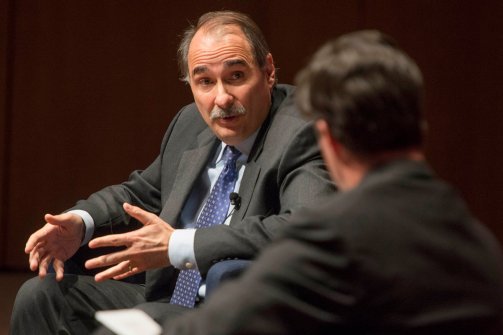Obama Campaign Shocked at Romney's Missed Opportunities
President Obama’s top reelection strategist conceded surprise Monday that Republican super PACS didn’t attack Obama far earlier, Mitt Romney didn’t invest much more in ground operations, and that the Republican nominee played narrowly to the party base in picking Rep. Paul Ryan as a running mate.

David Axelrod, senior strategist for President Obama's reelection campaign, at a University of Chicago public forum, Nov. 26, 2012. (Robert Kozloff, Courtesy of The University of Chicago / AP Photo )
Offering a lengthy dissection of the campaign, David Axelrod told a Chicago audience that he was “a bit surprised that super PACS, which spent an unbelievable amount of money,” didn’t hit television and radio with anti-Obama ads until May.
“Our air defenses weren’t ready,” he said, alluding to his side’s early lack of resources. “They gave us a pass, for whatever reason.”
At the same time, he was surprised that a plausible, distinctly positive image of Romney as successful businessman was not central to Romney’s media strategy until late fall. In part he ascribed that to Romney’s “Faustian bargain” to get the Republican nomination and tacking far to the right while also unleashing a barrage of mostly negative ads against GOP primary rivals.
The Obama camp assumed that after Romney sewed up the nomination, he would offer that more upbeat aura in his ads. “They never did that,” Axelrod said at the evening gathering at the University of Chicago.
As for Ryan, Axelrod personally figured former Minnesota Gov. Tim Pawlenty would be the choice, possibly Sen. Rob Portman of Ohio. His doubts about Ryan were a function of tough-minded views on privatizing Social Security and making significant changes in Medicare.
And as for the Republicans’ field operation, their comparatively small investment played into the Democrats’ hands and was not forecast by Axelrod, either.
Axelrod’s comments to a large audience amounted to a postmortem on his final political campaign and a segue to his career’s next chapter, overseeing the university’s new Institute of Politics.
He conceived the notion of a future rival to Harvard’s Kennedy School, among other institutions, with an accent on undergraduate education; pitched the concept to Chicago and Northwestern University; cut a deal with his alma mater, and has assembled a solid staff to execute the initial vision, including fellowship and internship programs. For example, this past campaign’s plethora of polling, some both erroneous and influential, will be an early topic of examination, he revealed Monday.
“Our air defenses weren’t ready. They gave us a pass, for whatever reason.”
The session itself touched a wide variety of topics, mostly involving the campaign and the state of American politics. It had its languid spots and one moment in which Axelrod came off as somewhat defensive, namely when asked about political consultants and negative ads “degrading the system,” as one student questioner put it.
While agreeing that the two campaigns were beneficiaries of ads that degraded the political process, he cited just one, by a pro-Obama PAC and not approved by the campaign, as an example. Other anti-Romney ads that some observers felt were unfair were not mentioned.
“This was a very tough election,” he said. “And we had to make a case as well.”
He asserted that the earliest Obama ads in battleground states were distinctly positive. But it became clear that “if we allowed Romney to be the hazy, local Chamber of Commerce president” in his ads, “that was not in our interest.” A barrage of harsh anti-Romney ads ensued early and, many observers contend, did irreparable damage to Romney even before he officially was the GOP nominee.
In the final days of the campaign, Axelrod told Fox's Chris Wallace that Romney was behind in battleground states.
As for the dramatic increase in super PAC dollars, Axelrod noted that Obama has underscored his own disagreement with the Supreme Court decision, known as Citizens United, which opened the floodgates. At the same time, “I would not advise the Democratic Party to lay down arms and get mowed over in the next campaign” by eschewing such support.
Axelrod was his frequent droll and insightful self at times, including when discussing his return to the White House one Saturday after he’d left his West Wing position. His purpose was to assist in writing jokes for Obama’s speech that evening at a Washington dinner.





